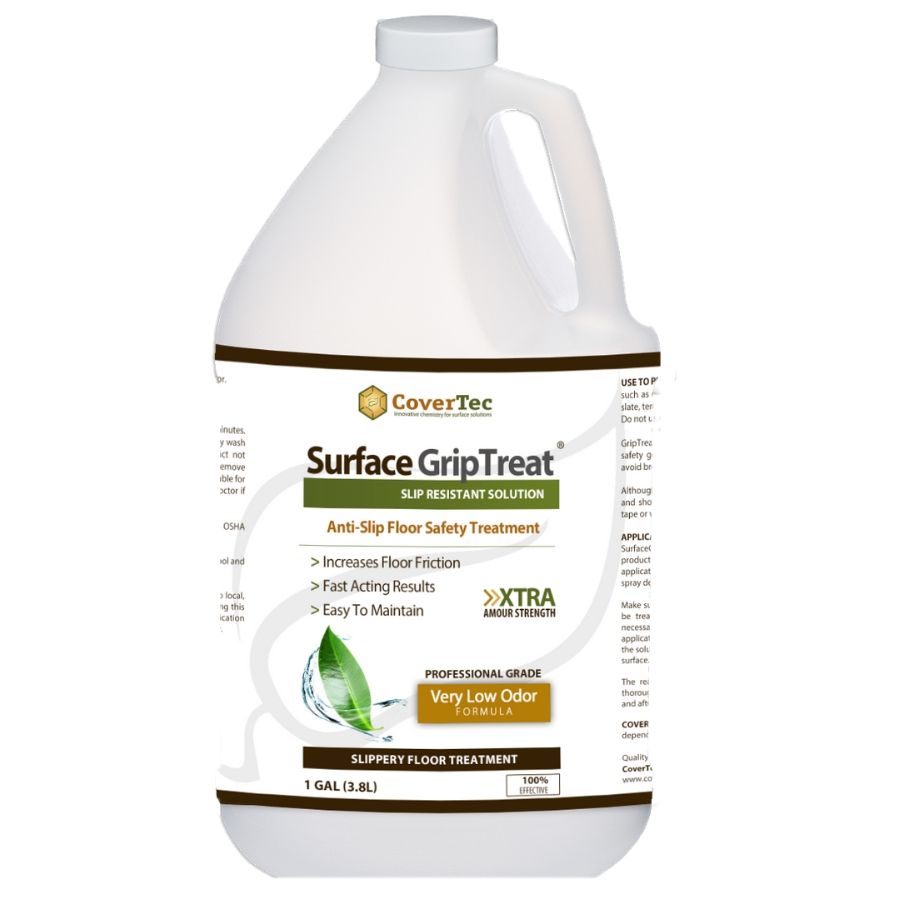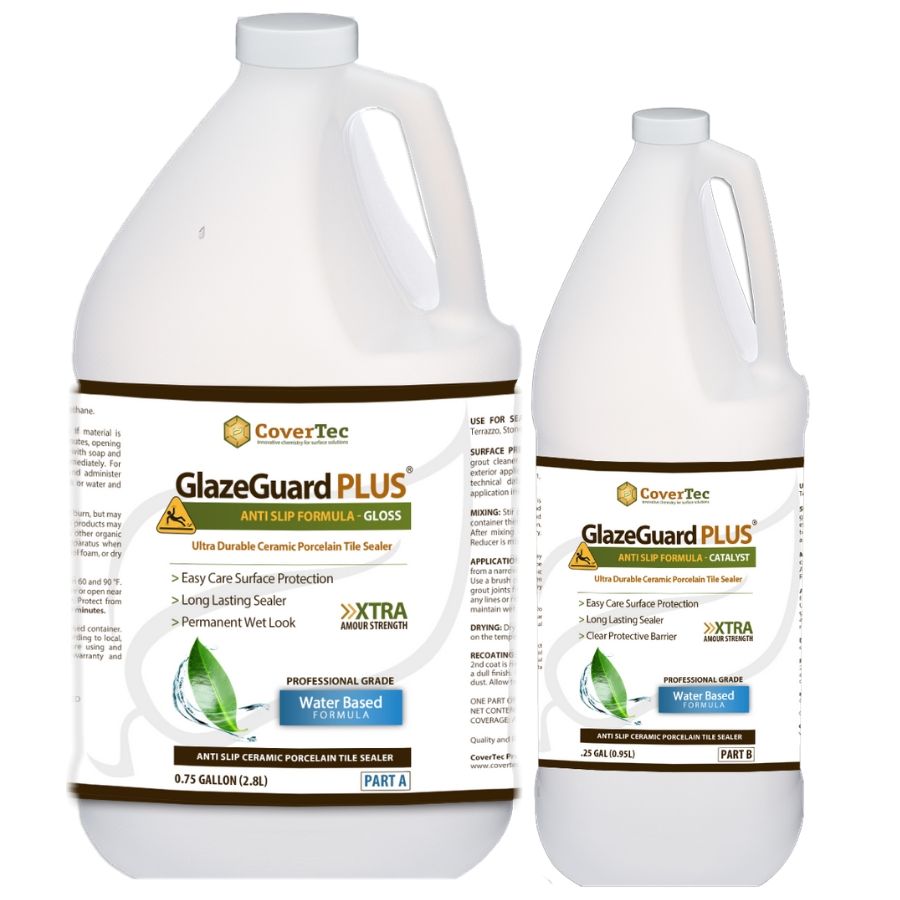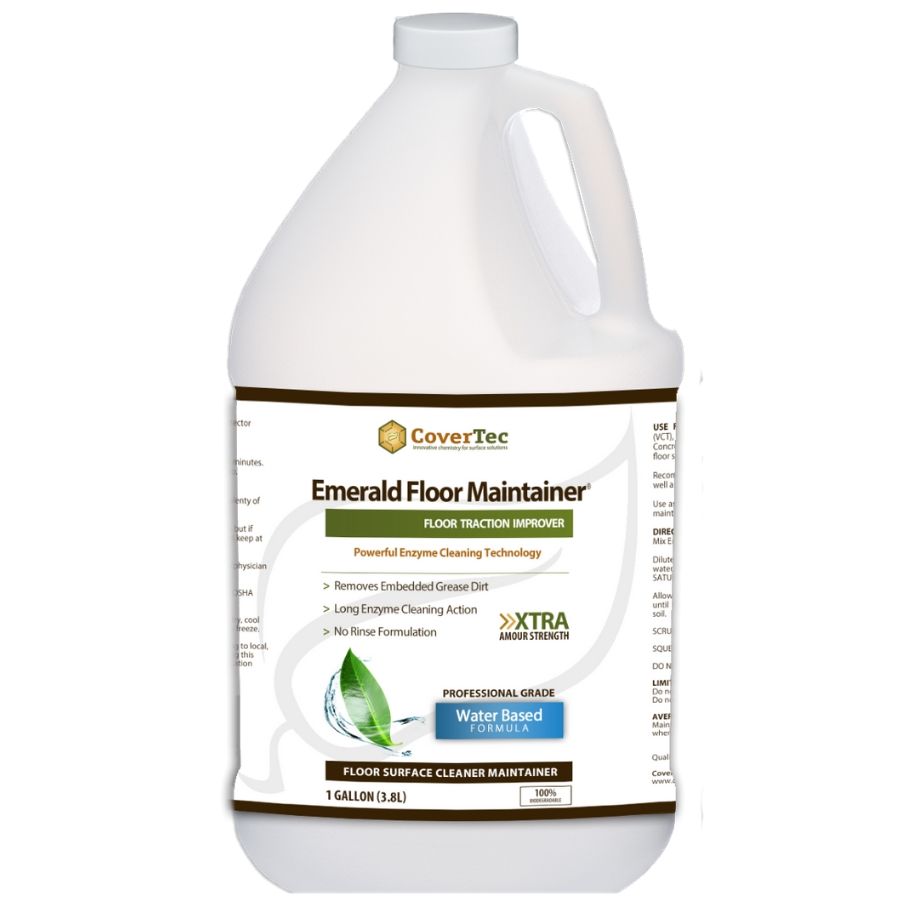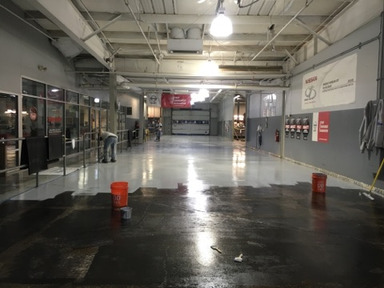How Industrial Floor Coatings Can Add Value to Your Business If you run a business,…
How To Deal With Slippery Floor Tiles
Making floors slip-resistant requires a clear understanding of what you are working with. These are the factors that impact whether a floor is slippery or not:
- The condition of the floor
- The flooring material
- The condition and the material of the footwear interacting with the surface
- The contaminants present on the floor
- The physical ability of people walking on the floor.
In this post, we’ll cover several slippery floor types… and show you how to reduce the possibility of slip and fall accidents on your premises. Whether you’re at home or on business premises, we’ve got you covered.
Details below. Click to go there now.
How To Solve Slippery Floors… In General
To clarify bullet point # 5 above, if the person is elderly or handicapped in any way, they would handle a slippery surface differently compared to a healthy, young person. All these factors affect potential slip and fall issues on a floor.
At CoverTec Products, we focus on:
- Controlling or influencing the condition of the floor,
- The Coefficient of Friction (COF), and
- Helping to clean off the contaminants thoroughly for our customers.
More specifically, our products provide ways to better clean the floor without leaving residues behind (thus maintaining the C.O.F.).
We offer better cleaning chemicals than competing in-store brands, along with industry-insider cleaning tips and best practices.

We also provide treatments and products that improve the floor condition, increase the C.O.F. or traction, and make a notable difference in the slip-resistance of a surface.
Why Is My Tile So Slippery?
The reason why your tile floor is slippery is probably because of the texture or the current condition of the surface. That is, it’s either very smooth and/or there are surface contaminants on it which makes it slippery.
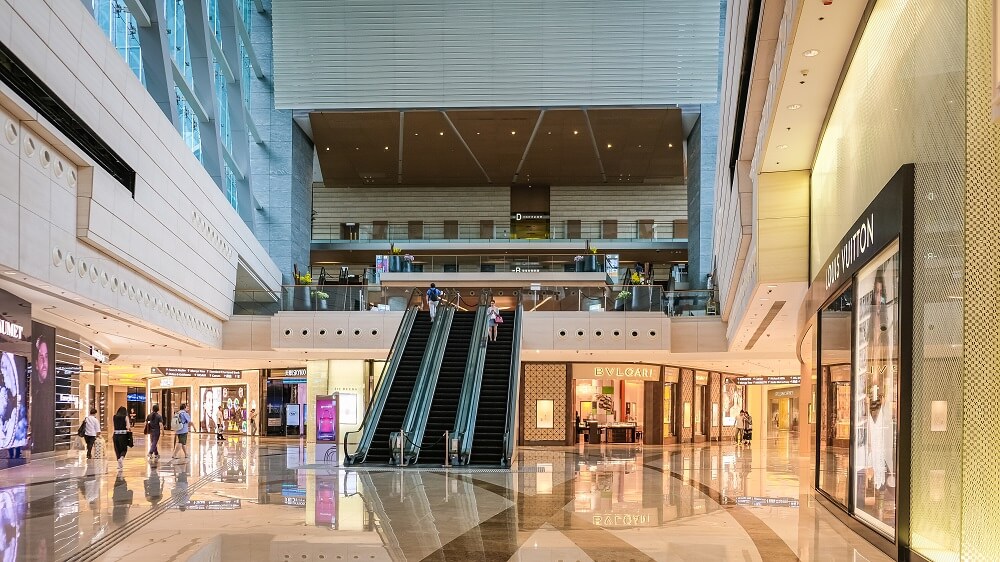
For example…
- If you’re in a locker room, you’re going to have soap and water. Wet soapy residue is extremely slippery.
- In hospitals there are cleaning chemicals.
- In restaurants, there are food prep areas, grease, oil, etc.
All these types of contaminants will make a floor slippery. If the floor itself is very smooth, then it’s more likely to be slippery.
If the floor is slippery specifically after mopping, that is probably because there’s a residue left on the floor.
Most likely, you’re using a de-greaser, and the solvents present in them are just thinning out the contaminants.
Essentially, you’re just spreading contaminants like grease and oil around the floor, instead of removing them or eliminating them.


How Do You Fix A Slippery Floor?
At CoverTec, we recommend two ways to solve the problem of slippery floors.
- First, by changing the surface characteristics of the floor and making it a much higher traction floor.
- And secondly, by using more effective cleaning materials.
Either microbial or enzyme-based materials that consume and remove the contaminants, rather than spreading them out and leaving them a thin residue.
Using Surface Modifiers Or Traction Enhancers
Our options for changing the surface characteristics include our Surface GripTreat.
This is a chemical treatment which – at a microscopic level – modifies the surface of the floor, deepens the surface pores, and provides a suction effect when the floor is wet.
As you walk on it, instead of aquaplaning across the wet surface, your foot or shoe will grab the floor. The reason is that the top surface becomes more absorbent after the treatment.
Non-mineral floors such as wood, vinyl, epoxy, etc. cannot be modified in the way described above and require texture to be added by using a topical sealer or coating.
A second option would be our GlazeGuard Plus. If you’re looking for a slip-resistant coating or sealer for these surfaces, and want it to be waterproof or chemical resistant, this is something you should look at.
This coating contains our CoverGrip additive that is highly slip-resistant. You can use it to:
- To waterproof tile and grout
- Topcoat Epoxy and Polyurethane
- Protect vinyl and rubber floors
- Seal pavers and wood decks
- Interior and exterior.
The third option available for increasing slip-resistance to your surfaces is using nano coatings.
These provide an opportunity to increase the C.O.F. on a very smooth surface without changing the appearance, allowing you to maintain the look and sheen on a smooth or polished floor. The results are both safety and beauty.
This solution is an excellent choice for situations involving:
- Polished concrete, terrazzo and stone
- Lobbies and entrance ways
- Restaurant floors
- Shopping malls
- Airports
- Etc.
In these high traffic areas, our nano coating product provides a high traction surface, and maintains the shine. Contact us at the number above for our recommended product in stock.
Third Party Testing
To better ensure walkway safety at the workplace and at home it is important to use products that have been third party tested for C.O.F.
At CoverTec, our anti slip products are third party tested to the latest standard ANSI / NFSI B101.3 Wet Dynamic COF Standard (Wet DCOF)
This National Floor Safety Institute test is a moving (dynamic) test and not a static test like older standards. As such when it comes to walkway safety it is a much more realistic test. Essentially people slip when they are moving not when they are static.
ANSI / NFSI B101.3 also uses a soap solution as part of the test to simulate a water and grease contaminant.
Specifiers and designers alike should always check for anti-slip solutions that are third party tested and compliant to the latest and relevant national standards.
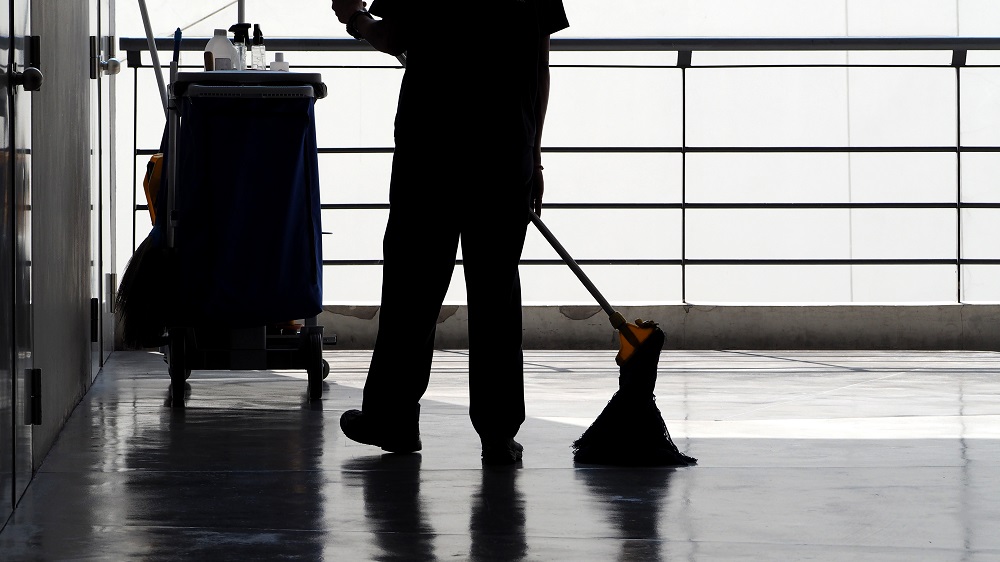
Better Cleaning & Maintenance
The 3 solutions recommended above address improving the condition or the characteristics of the floor. Now, let’s cover what can be done by just improving the cleaning practices used on the surface. At CoverTec, we suggest using microbial-based cleaners.
CoverClean FG
One of our most popular is a heavy-duty cleaner called CoverClean FG. It’s extremely efficient in deep cleaning stubborn food or animal-based oils and grease.
CoverClean HC
If you’re dealing with petroleum-based oil or grease on your floors, you can use our CoverClean HC. The “HC” stands for Hydrocarbons. The product uses very special living microbes that consume the oils, instead of just thinning it out and dispersing it across the surface.
It’s much more effective that regular de-greasers… not to mention much safer for humans, aquatic life, pets and the environment.
In-store de-greasers typically use solvents to thin-out contaminants and just spread it out further – so they APPEAR to be gone. This actually endangers the floor area because you’re spreading an oily substance over a wider area.
This increases the possibility for a slip or fall due to the loss of traction. You also have the risk of cross-contamination because the mop you’re using could be taken to another area… and contaminate there as well.
Emerald Enzyme
The third microbial cleaning product our customers love is Emerald Enzyme, which can be used on a day to day basis.
It’s a cost-effective product that you use on your floors daily. That is, after you’ve deep cleaned the surface, this cleaner helps you manage its cleanliness.
It’s used as both a cleaner and a maintainer. It keeps the pores clean and maintains the floors slip-resistance when wet.
How Do You Make Glossy Tiles Anti-Slip?
Choosing the right solution to make glossy tiles slip-resistant depends on a few criteria. Some of them are:
- Is the floor interior or exterior?
- What is the amount of traffic the floor handles?
- Does the floor need any stain protection or waterproofing?
- And what is the desired appearance of the surface.

Surface GripTreat
For exterior applications, we usually recommend first the Surface GripTreat product. It requires less maintenance, and it provides longer lasting results outside.
If the floor is going to be frequently exposed to water and moisture, Surface GripTreat is an excellent choice, whether the surface is indoor or outdoor.
Think of surfaces you’ll find in:
- Public restrooms (as in shopping malls, airports, exercise gyms, etc.)
- Public Gym showers
- Pet kennels, etc.
- Packaging factories
- Loading ramps that are exposed to weather
- Etc.


GlazeGuard Plus
If – in addition to slip-resistance – the floor (or grout) needs stain protection or waterproofing, then the best option you have is using the GlazeGuard Plus. You would also use GlazeGuard Plus on non-mineral surfaces like vinyl or wood.
It’s been developed to bond to ceramic and porcelain glossy tile. It has a longer drying time, but it is very durable and very chemical and water resistant.


GlazeGuard Plus is useful on tile surfaces that normally experience high traffic with constant exposure to contaminants.
Areas like:
- Retail establishments
- Supermarkets
- Cafeterias
- Restaurant kitchens and serving areas
- Commercial buildings
- Large consumer access-ways (building entrances and exits)
- Industrial facilities
- Warehouse loading bays
- Hospitals, clinics and veterinary offices
- Etc.


Tile SlipShield
If the floor was an interior, high-gloss polished surface, then we would recommend our Tile SlipShield. It’s a good option for maintaining the appearance of the tile. It can also be used in entrance-ways, lobbies, building access-ways with minimal shutdown of the foot traffic.
Think of surfaces like these:
- Polished Concrete
- Polished Porcelain and Ceramic
- Polished Stone
- Terrazzo
- Granite
- Marble
- Travertine
- Etc.


One of the key characteristics of the Tile SlipShield is that it dries in 10 to 15 minutes.
This means that it can be applied -including prep and cleaning – within 45 minutes to 1 hour and then, you’re able to use the floor again.
How Do You Fix A Slippery Concrete Floor?
Let’s talk about how to make sealed concrete (or un-sealed concrete surfaces) slip resistant.
Simply put, the answer to which product is right for your situation comes down to answering a few questions.
- What is the floor’s environment like?
- What’s it designed to do?
- Is it a showroom or is it a plain old warehouse floor where you’re housing goods?
- Is it a residential area?
- Is it a situation where the floor is a very smooth tile?
- Is it polished concrete?
Only after this, can you determine which product will provide the best slip-resistance.


Firstly, let’s identify typical consumer and commercial situations where slippery concrete is a real problem.
- Decorative, polished concrete (seen increasingly in commercial and residential environments)
- Retail Shop floors (inside and outside, at the front and rear entrances)
- Service station floors (gas stations, auto repair shops, car accessory retailers, car sales lots, etc.)
- Warehouse building floors (storage facilities, showrooms, manufacturing locations, etc.)
- Retail outlet floors (big-box stores, bulk retailers like Walmart and Costco)
- Etc.


These consumer and commercial situations are filled with concrete surfaces that undergo varying levels of wear and tear from foot and vehicle traffic, as well as chemicals and contaminants.
For the highly polished decorative surfaces, we recommend using the Tile SlipShield.
The more industrial, workshop-type environments that likely need stain and chemical protection should be coated with our epoxy coatings, oil and stain resistant coatings, and our GlazeGuard Plus product.
For exterior areas or areas that frequently get wet we would recommend our Surface GripTreat which is easy to maintain.
For specific answers on which of these industrial products is best for you, feel free to contact us at the number above.
Did You Forget Ongoing Maintenance?

After speaking to several thousand customers, virtually all of them forget to think about maintaining the floor’s slip-resistance.
Just because your floor is not slippery now, that doesn’t mean the protection won’t wear off under heavy foot or vehicle traffic or exposure to chemicals and contaminants.
On a surface treated with GlazeGuard or our epoxy with CoverGrip additive in it, those floors will have to be brushed or washed down to keep them clean.
With a floor that has Tile SlipShield, as long as we sweep the floor properly to keep the dry contaminants off it, it’ll be easy to maintain.
And if you’re using the GripTreat additive, we recommend that you use our Emerald Enzyme cleaner to maintain the surface and keep the concrete pores from getting clogged up with grease and other contaminants.
How Much Time Until The Floors Must Be Back In Service?
Then other thing we recommend is that customers be aware of is the installation time. That is, how much time do you have to apply the product, let it dry, and be safe for foot and/or vehicular use again.
The GlazeGuard Plus product needs 12 hours to dry.
Knowing this, if the floor appearance is not much of an issue, but a short dry time is, then using Surface GripTreat may be a good solution.
If much faster turnaround time AND a good sheen are necessities, then Tile SlipShield is more suitable more appropriate in the moment.
This product is not as heavy duty as GlazeGuard Plus, but it only needs 15 minutes to dry.
The Bottom Line
If you need something that is highly chemical-resistant first. Then factor in:
- How much application and dry time you can work with?
- Is having a glossy appearance critical?
These evaluations will help you select the best option. As always, you can contact CoverTec support at the number shown above, and we’ll guide you as best as possible.
How Can I Make My Epoxy Floor Less Slippery?
Epoxy, urethane and polyaspartic types of coatings are now very popular in industrial, retail, and residential environments.
Examples include:
- Warehouse and industrial product display areas for walk-in customers.
- Mall food courts, store check-out counters and decorative displays.
- Home kitchens, basements and garages.
- Workshops, service areas, and showrooms.
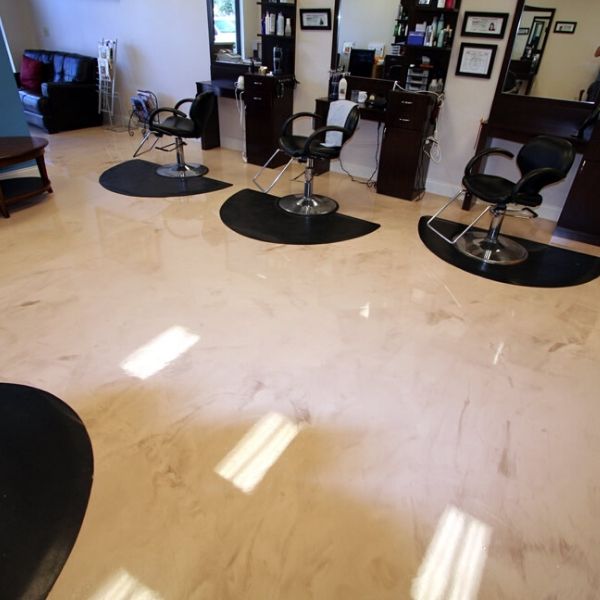

While epoxy can be attractive and durable, it can be very slippery when wet. And you must be able to change those surface characteristics by putting on a topical coating.
In this case, our GripTreat doesn’t work on epoxies or polymers. It works only on a mineral-types of surfaces.
As a result, our choices are GlazeGuard Plus or the Tile SlipShield nano coating, both of which can be used very effectively on epoxy.
If you prefer the high chemical-resistance, then select GlazeGuard Plus.
If dry time, fast turnaround and a very smooth, shiny surface is required, then the Tile SlipShield is your option.
Again, the protection of Tile SlipShield won’t be as durable as that of GlazeGuard Plus, but it’ll be easy to maintain that high shine appearance.


How To Make Tile Shower Floors Less Slippery
For commercial places where the surfaces are exposed to heavy moisture like shower rooms and locker rooms, we strongly recommended GlazeGuard Plus because it’s extremely water-resistant.
Aside from its heavy-duty slip resistance, it also provides exceptional protection from contaminants such as cleaning chemical residues and urine.
It also protects both the tile and the grout.
For residential situations, where the foot traffic and cleaning chemical exposure is less, you can use Surface GripTreat.
However, be aware that GripTreat does not offer any stain or water resistance so it won’t protect the grout in the way GlazeGuard Plus does.
Too Many Slippery Surface Situations
As you can see, handling slippery floors can be a broad subject to cover.
We’ve tried to answer the usual questions we get from our customers to provide you some guidance on how to mange your situations as a consumer or a contractor.
If you’re still confused about which product is the best solution for your job at hand, contact our support team, or call us at the number shown above. They’ll help you choose the ideal solution.

